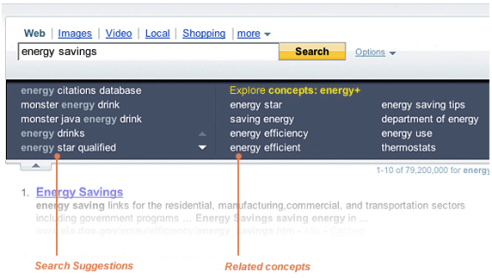 Today, Yahoo added new search features and functionality. Video embedding (via Yahoo Video, YouTube, and MetaCafe), Flickr integration, event information (via Upcoming.org), and new Yahoo Shortcuts were all introduced. We’re seeing all this wonderful social media integration - so what’s the big problem? It’s biased. And search engines shouldn’t be biased.
Today, Yahoo added new search features and functionality. Video embedding (via Yahoo Video, YouTube, and MetaCafe), Flickr integration, event information (via Upcoming.org), and new Yahoo Shortcuts were all introduced. We’re seeing all this wonderful social media integration - so what’s the big problem? It’s biased. And search engines shouldn’t be biased.
To be honest, I’m genuinely upset about the changes. Not only do they add more clutter to the page, but they’re decreasing the overall quality and relevancy of the search engine. Furthermore, Yahoo is getting praise for these changes. Many are even saying that the company is catching up to Google. I even heard a whisper of the term “Google killer”. This is a bold statement and it can’t be farther from the truth. In reality, Yahoo is widening the gap. They are drifting further away from Google, as they are providing less relevant, more biased results. They are redefining ‘vertical creep’. On the occasion, Yahoo will have the most relevant result on the entire net, but more often than that, it won’t. What Yahoo needs to do is go back to the drawing board and work on their algorithm. This is the bread and butter of any search engine. Forget the web 2.0 app integration.
Pardon my rant, but I’m not a big fan of this move. It is company bias in a space where there should be no bias. All this new integration means that a given user will (in most cases) not be receiving the best quality, unedited, clean, no-strings-attached results. Rather, they are subjected to ’Yahoo’ results and links to Yahoo properties. In my opinion, this leads to higher short-term benefits (and revenues) for the company due to an increase in page views, but translates to long-term problems in the areas of relevancy and perception.
If Yahoo does want to include such results in search, place this information in the sidebar and provide disclosure around it. Numerous others have done it in the past, so why not Yahoo? By integrating company results into the natural search results, it confuses and/or deceives the user. This isn’t in the best interest of the company - at least in my mind. Another possible solution is richer functionality in the ‘vertical search tabs’. If I really want images or videos in my results, I search via Yahoo Image search or Yahoo Video search, not regular search. I think there is an opportunity here, but Yahoo is being greedy.
I say, “Just gimme the best damn results.” Google does a pretty darn good job of this. They haven’t cluttered the results or riddled the page with endless amounts of company-centric material.
One bright spot for Yahoo is Search Assist. This new tool (somewhat akin to Google Suggest) provides contextual suggestions and conceptual recommendations for your search queries. This saves time and hassle, and may indeed aide you in reaching the most relevant results. So why do I like this? As opposed to the other Yahoo features, this one is unbiased (at least I HOPE). It is based on user behaviour, patterns, and trends.
Below is a screenshot of Yahoo Assist (courtesy of Search Engine Journal):

In the end, I think what Yahoo is trying to do is capitalize on all their recent web 2.0 acquisitions by integrating them into search. I think it’s a valiant idea, but involved poor execution. As I mentioned before, I don’t think that integrating such results into the natural search results is the optimal strategy. Company bias and and self-fulfilling intentions start to play a role, and all of a sudden, people are starting to question the credibility and trustworthiness of search. Losing trust is probably the worst possible outcome for Yahoo at this point in the game.
![]() Google has been on a tear recently. The stock closed at a 52-week high today (just over $740 a share). The announcement of OpenSocial catapulted the stock to new heights. The upward climb has been fueled constant earnings blow-outs. But these can’t last forever. With every consecutive positive surprise, more and more pressure is placed on the company. Mark my word - one of these earnings reports will fall short of expectations and will stock will get absolutely hammered. A $300+ drop in a day is not out of the question. As they say, nobody stays at the top forever.
Google has been on a tear recently. The stock closed at a 52-week high today (just over $740 a share). The announcement of OpenSocial catapulted the stock to new heights. The upward climb has been fueled constant earnings blow-outs. But these can’t last forever. With every consecutive positive surprise, more and more pressure is placed on the company. Mark my word - one of these earnings reports will fall short of expectations and will stock will get absolutely hammered. A $300+ drop in a day is not out of the question. As they say, nobody stays at the top forever.